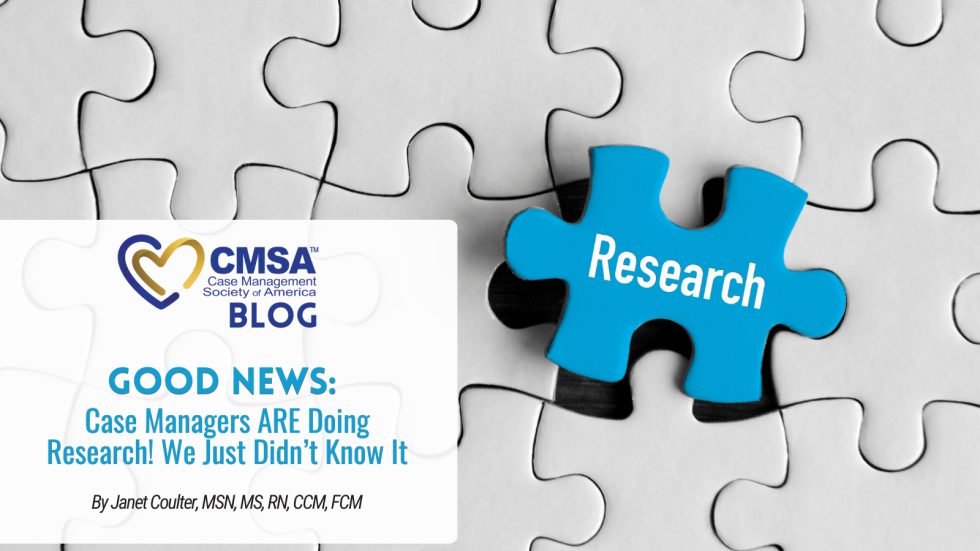In my favorite musical Hamilton, the lead actor sings “I’m not throwing away my shot.” Don’t throw away YOUR shot! Take this opportunity to share your knowledge and research with the case management community.
As case managers, we are intelligent, inquisitive and resourceful. We strive every day to help our clients navigate through the healthcare system. We are professionals who adhere to ethical standards and possess special knowledge and skills. To become more widely recognized in the healthcare arena and our communities, we, as a profession, need to have a body of learning derived from research, education and training. We have an extensive knowledge base, but very limited research directly related to case management. Our profession needs more research.
You may be asking yourself “Can I do research?” or saying, “I don’t know where to start.” Well, CMSA Foundation is here to help. You don't have to be a research professional to start conducting research.
As case managers, we do research every day whether it is looking at readmissions, effectiveness of patient teaching and many other processes. We use the scientific process: assessment, analysis, goals, intervention, analyze and evaluation when dealing with issues. The scientific process (or some of us know this as the nursing process or problem-solving) IS research. Scientific process is a systematic way of looking at a situation, analyzing the situation or issue, formulating a question, developing interventions and evaluating the effectiveness of those interventions. Process improvement is about asking questions, pursuing answers and using evidence to support your results. Case managers use process improvement every day. Process improvement refers to the practice of finding ways to make existing processes faster, more accurate, more efficient and more reliable. Research and process improvement have a tremendous influence on current and future case management practices.
What kind of research is meaningful to a case manager?
- Patient outcomes
- Patient care
- Family education
- Community resources
- Social determinates of health
- Prevention
- Medication management
Throughout the 21st century, the role of the case manager has evolved significantly. Case managers work in a variety of settings and, although each role has different responsibilities, the primary goals remain the same: to assist our clients to navigate through the healthcare system to receive the best possible outcomes, to advocate for our clients and provide optimal care based on evidence obtained through research. Case management research is vital for the practice of case management and the advancement of our profession. Your research has the potential to directly impact care provided in many healthcare settings.
Research is needed to expand the body of knowledge of case management and increase the professional standing of case management. Sharing your research findings with other case mangers is so important. You can communicate your research or process improvement project and the findings in a written report, presentation or poster. A perfect way to share your research is to apply for the Case Management Society of America Foundation Award for Case Management Research or the Award for Case Management Practice Improvement. These awards are presented every year at the CMSA Annual Conference. Another way is to apply to present your research at the CMSA Annual Conference by doing a presentation or a poster. Communicating your research findings is very important! Sharing research and process improvement information with other case managers will allow case managers to advocate for their clients and provide the best possible care and others will benefit from your research.
Be proud of your work as a case manager!
Don’t throw away YOUR shot at improving case management through research and process improvement.
Apply for the Case Management Society of America Foundation’s Award for Case Management Research or the Award for Case Management Practice Improvement: https://www.cmsafoundation.org/awards
Winners receive a cash award, and article in CMSA Today, a blog on cmsa.org, a webinar for CMSA members, recognition at the CMSA Annual Conference and the opportunity to provide a case study resource for case managers. Applications are due March 30th!
P.S. If you miss the application deadline for this year, plan ahead for next year!
Bio: Janet Coulter, MSN, MS, RN, CCM, FCM, is a transplant case manager with a wide variety of experiences including educator, administrator, team leader, and Director of Case Management. Janet holds a Master of Science in Nursing from West Virginia University and a Master of Science in Adult Education from Marshall University. She has published many articles in CMSA Today and the Professional Case Management Journal and served as a reviewer for the Core Curriculum for Case Management Third Edition. She currently serves as Chair of the CMSA Today Editorial Board and Secretary of the CMSA Foundation board. Janet was the recipient of the CMSA National Award of Service Excellence and Southern Ohio Valley CMSA Case Management Leadership award and was recently inducted as a Case Management Fellow from CMSA.


Well said!!
Thanks, Mary Lee!
Totally agree Janet, Case Managers do research, and it is up to us to share the knowledge. We need to share with our colleagues what we learn.
Appreciate your support, Becky!
Absolutely!! Great blog Janet
Thanks, Tina!
Hi Janet, you had me at Hamilton! LOL! Seriously though, you have an amazing way of looking at things, and I always love how you help connect the dots. Your insights on research are insightful and inspiring!
Thank you, Mary Beth. I knew you would like that reference to Hamilton! LOL!
So true Janet, case managers research and knowledge are invaluable to patients’ outcomes.
Great blog….keep up the great job.
Thank you, Mary Ann!
Well said Janet. Sharing research and process improvement outcomes adds tremendous value and contributes to the body of knowledge within the professional case management community. ⭐️
Thank you, Pat.
Janet: your blog hit it out of the park with the big picture of what is possible in case management & sharing with other case managers what we have learned, how we have helped our consumers!